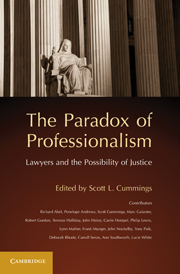Book contents
- Frontmatter
- Contents
- List of Tables and Figures
- Contributors
- Preface and Acknowledgments
- 1 Introduction
- PART I LAWYERS AND THE PUBLIC GOOD: THE FUNDAMENTAL DILEMMA
- 2 Are Lawyers Friends of Democracy?
- 3 “The Conscience of Society?”
- 4 More Lawyers than People
- 5 Faces of the Tort Pyramid
- PART II LAWYERS AND THEIR CLIENTS: DETERMINANTS OF ETHICAL PRACTICE
- PART III LAWYERS AND SOCIAL CHANGE: MOBILIZING LAW FOR JUSTICE
- 14 Epilogue
- Index
- References
4 - More Lawyers than People
The Global Multiplication of Legal Professionals
Published online by Cambridge University Press: 05 June 2012
- Frontmatter
- Contents
- List of Tables and Figures
- Contributors
- Preface and Acknowledgments
- 1 Introduction
- PART I LAWYERS AND THE PUBLIC GOOD: THE FUNDAMENTAL DILEMMA
- 2 Are Lawyers Friends of Democracy?
- 3 “The Conscience of Society?”
- 4 More Lawyers than People
- 5 Faces of the Tort Pyramid
- PART II LAWYERS AND THEIR CLIENTS: DETERMINANTS OF ETHICAL PRACTICE
- PART III LAWYERS AND SOCIAL CHANGE: MOBILIZING LAW FOR JUSTICE
- 14 Epilogue
- Index
- References
Summary
“If the current rate of increase continues, by 2000 this country will have more lawyers than people.”
INTRODUCTION
Looking back, I am impressed by how many institutions that once seemed bedrock foundational parts of the world – railroads, corner stores, newspapers – have disappeared or morphed into things quite different. But it is not always easy to tell which things are in decline and which are in the ascendant. At mid-century, it appeared to many observers in the United States that law had reached its maturity. Litigation was in a deep trough. Knowledgeable judges and practitioners lamented its decline. As late as 1963, the Dean of the Wisconsin Law School observed that “law is a dwindling profession. In numbers it has remained fairly constant while everything else grows.” But through the corrective lens of hindsight we can see that at that very time, law in the United States – and elsewhere – entered a period of unprecedented growth on a number of dimensions – the amount of litigation, the number of lawyers, the density of legislation and regulation, expenditures on law, and its presence in public consciousness. I think it is fair to refer to this growth as legalization.
At least one part of this legalization complex – an increase in the presence of lawyers – is not confined to the United States, or to advanced industrial countries, or to common law jurisdictions, but is visible across a great part of the world. Lawyers everywhere are multiplying.
- Type
- Chapter
- Information
- The Paradox of ProfessionalismLawyers and the Possibility of Justice, pp. 68 - 89Publisher: Cambridge University PressPrint publication year: 2011
References
- 3
- Cited by



